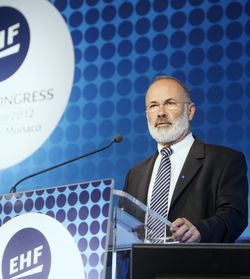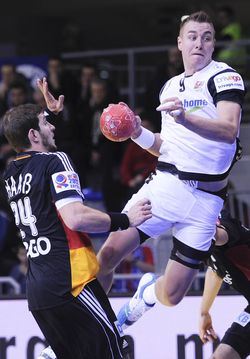

'Transforming handball games into handball events'
'Transforming handball games into handball events'
Five months ago, in June 2012, Jean Brihault was elected president of the European Handball Federation. The promotion of women's handball was one of the tasks he set himself when he took over the office. But this is not the only project he has in mind for the development of the sport as he explains to eurohandball.com.
eurohandball.com: Mr. Brihault, the newly created Women’s Handball Board, also founded in June 2012, will meet for the second time in December in Serbia. What has already been achieved in this short time?
Jean Brihault: At the first meeting it was decided to assess the situation of women’s handball in Europe. Proposals for questionnaires to be sent to federations and players have been made and will be distributed. On the basis of this assessment, further action regarding the future can be taken, but it is absolutely necessary to know what the situation is on the ground before you can make projects.
eurohandball.com: What are your personal expectations towards this new body?
Jean Brihault: I expect a contribution to the development of women’s handball. Women’s handball is absolutely superb to watch. There is a high technical level, tactical skills, physical commitment and psychological involvement. We have the exact same ingredients as in men’s handball.
What we don’t have – for reasons we have to analyse – is the same level of interest of sponsors and media, especially in the club competitions. What I hope for is that the analysis of the current situation will make it possible for the Women’s Handball Board to propose perspectives for development. And that we, on the decision-making level, shall be able to follow that.
eurohandball.com: The Professional Handball Board, the strategic platform for the key stakeholders within European men’s handball, also met this week. What are the topics this body is currently working on?
Jean Brihault: One of its main points was how we together can still improve handball as a product which will attract interest on all levels. It’s quite clear in our mind that we can’t separate the various competitions, the various levels of handball. The average spectator is interested in handball and does not care so much if it’s a club competition or a national team competition. So we have to make our handball events even more interesting in the interest of all stakeholders.
eurohandball.com: One of the more recent changes made was related to the competition format for the Men’s EHF Cup. As the host for the first final tournament will be announced in December, in which respect is the EHF Cup going to benefit?
Jean Brihault: We are making it more visible. We observed in the past that even though you could have two excellent teams in the final, this did not attract major interest. So we want to make this second tier European Cup event after the Champions League into a major event. And having four teams together for semi-finals and finals contributes to that. It makes it more of an event than a single game and also it tends to encourage supporters to travel more, especially if they are able to go to an attractive place.
Also merging the two former cup competitions (EHF Cup and Cup Winners’ Cup) meant that the competition will be more intense and will be on a higher level. Games will not be as easily won as they were in some circumstances in the past. It makes the competitions more attractive – for the spectators and as a consequence for the players whose level of motivation is enhanced.
eurohandball.com: Do you expect a similar change in the women’s handball competitions?
Jean Brihault: The possibility clearly exists. But it is also a question of timing. If you are too late, you have wasted time. But if you are too early, you miss an opportunity. This was already our reasoning with the Men’s Champions League FINAL 4. We set it up, we organised it when we were ready for it.
If you start a first edition which is less than a success, or which can even be a flop, you give such a disastrous signal that potentially it can take years to recover. You must have a guarantee that the first edition is going to be a success. So you have got to assess the degree of maturity of the competition but also of the potential organisers and of the sponsors before you launch into that.
So I hope to see a development where we can have the same for the Women’s Champions League and for the other European Cups as we have for men. But we must find the right time slot.
eurohandball.com: Handball is competing for publicity with various other team sports in Europe. What does the sport need to do to permanently remain in the top three team sports?
Jean Brihault: This is where it should belong and it’s already the case in a number of countries. So we are not in a bad position in the moment.
The challenges we have to meet are more on the periphery of the game than in the actual game itself. Handball is attractive – a good sign for this was the success at the London Olympic Games with a public that had rarely seen handball before.
One of the main issues is the size of the arenas. When we want to have major events, let’s say the FINAL 4 at the moment, we are short of space to accommodate spectators.
Last year I was told that there were more than 50,000 requests for tickets for the FINAL 4 and we could just accommodate 20,000. So we have to find ways of accommodating big events in places that are sufficiently large – stadiums, large arenas.
The second point is that with intermediate events, not with the top level competitions, we need to make sure that they receive the attention they deserve. Here the talent and the competence of club managers is essential. We are trying to develop, this was an initiative taken by the Professional Handball Board and implemented by the EHF, educational programmes for club managers so that they master skills not only in the field of human resources, with their players and coaches, but also in the field of marketing events and transforming handball games into handball events. The way we do it, for example, with the FINAL 4.
eurohandball.com: To pick one example: Handball in Great Britain enjoyed huge support in the lead-up and during the London Olympic Games. But what does it take to keep this enthusiasm going?
Jean Brihault: Great Britain is an interesting case. The game is available to them; they did well considering their starting point at the Olympic Games, especially the women. And there is interest. I think that their big problem – and therefore our problem – is going to be where can we play handball? There is no handball tradition and they don’t have the school gyms that we have in other countries in Europe, like the average school gym that can accommodate about 400 spectators. They miss this kind of basic equipment which will give handball the local roots in Great Britain.
eurohandball.com: The Women’s EHF European Championship in Serbia will throw off in December. What can handball fans expect from the event?
Jean Brihault: I am sure that we will have the same level of success as we had with the Men’s European Championship in January. We could see that the latest international competition for women, the Olympic Games, was on an extremely high level and I am sure that it will be a great competition once again. I hope that we have a good spectator success and the bookings are very encouraging in this regard.






